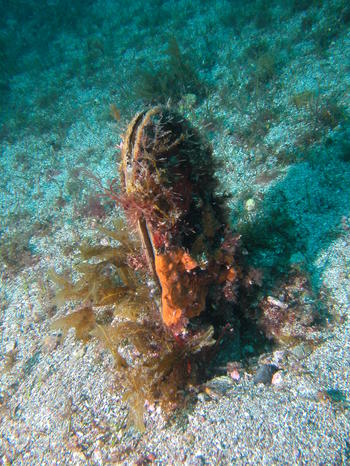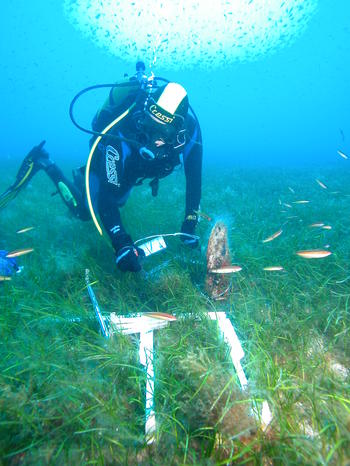Hard times for the Mediterranean fan mussel Pinna nobilis
Pinna nobilis. (Photo by D. Kersting)
Measuring Pinna nobilis shell length in the Columbretes Islands. (Photo by D. Kersting)
News vom 23.11.2017
Hard times for the Mediterranean fan mussel Pinna nobilis, one of the largest bivalves of the world
The Mediterranean endangered fan mussel Pinna nobilis is one of the largest bivalves of the world, reaching sizes up to 120 cm of shell length. Populations of this long-lived species have been greatly reduced during the past decades as a result of human activities, consequently it has been included in European and member states protection lists.
The journal Marine Environmental Research has recently published the results of a decade of studies on the early stages and populations dynamics of this bivalve, undertaken by D. Kersting (FU Berlin) and J. R. García-March (CU Valencia) in the Columbretes Islands Marine Reserve (Spain). The paper contributes with highly needed information on the larval and juvenile stages of P. nobilis, as well as information on recruitment, mortality and growth rates, which is essential to assess the vulnerability of the species.
The obtained results show that larval settlement of this bivalve occurs over a several months period, concentrating its peak in September and resulting from two separated spawning events. Interestingly, it was found that recruitment in artificial collectors was positively correlated to seasonal water temperature increase in June, which will help to predict “good” and “bad” recruitment years using water temperature as a proxy. On the other hand, differences in recruitment rates in artificial collectors and in the field allowed the researchers to disentangle the cause of the low occurrence of recruits in P. nobilis populations: predation. In fact, the authors found the existence of a refuge size for the species above 45 cm shell length. The fast growth recorded during the first years of life, when P. nobilis is most exposed to predation, is hypothesized to help shortening this vulnerability period.
This study shows that P. nobilis populations are highly dependent on the survival of adults. This, together with the low recruitment rates, undermine the recovery capacity of the species in front impacts and catastrophic events. Altogether, this study provides essential information and tools for the species’ conservation, which will be critical during the next coming years due to the mass mortality that is impacting P. nobilis over hundreds of kilometers in Spanish Mediterranean coasts.
The assessment of this mortality, published in Frontiers in Marine Science, has been undertaken by scientists working on the species all over the Spanish Mediterranean, including FU Berlin researcher D. Kersting. The results reveal extremely worrying mortality rates, reaching up to 100% in many sites. The cause of this devastating and rapid spreading disease has been found to be related to an haplosporidian-like parasite within the digestive gland of the bivalve.
Alarm has been raised to neighboring countries in front of the fact that the infection could be still in a spreading phase. Unfortunately, this mass mortality is forcing this emblematic and already endangered bivalve into a critical viability status in the region and potentially in neighboring locations.
Papers:
Kersting DK, García-March JR (2017) Long-term assessment of recruitment, early stages and population dynamics of the endangered Mediterranean fan mussel Pinna nobilis in the Columbretes Islands (NW Mediterranean). Marine Environmental Research https://doi.org/10.1016/j.marenvres.2017.08.007
Vázquez-Luis M, Álvarez E, Barrajón A, García-March JR, Grau A, Hendriks IE, Jiménez S, Kersting D, Moreno D, Pérez M, Ruiz JM, Sánchez J, Villalba A, Deudero S (2017) S.O.S. Pinna nobilis: A mass mortality event in Western Mediterranean Sea. Frontiers in Marine Science 4:220
Kontakt:
Dr. Diego Kersting
Freie Universität Berlin
Institut für Geologische Wissenschaften
FR Paläontologie
AG Geobiologie und Anthropozänforschung
Malteserstrasse 74-100, Haus C, C.102-103,
12249 Berlin, Germany
diegokersting@gmail.com
+49 (0)30 - 838 907714

